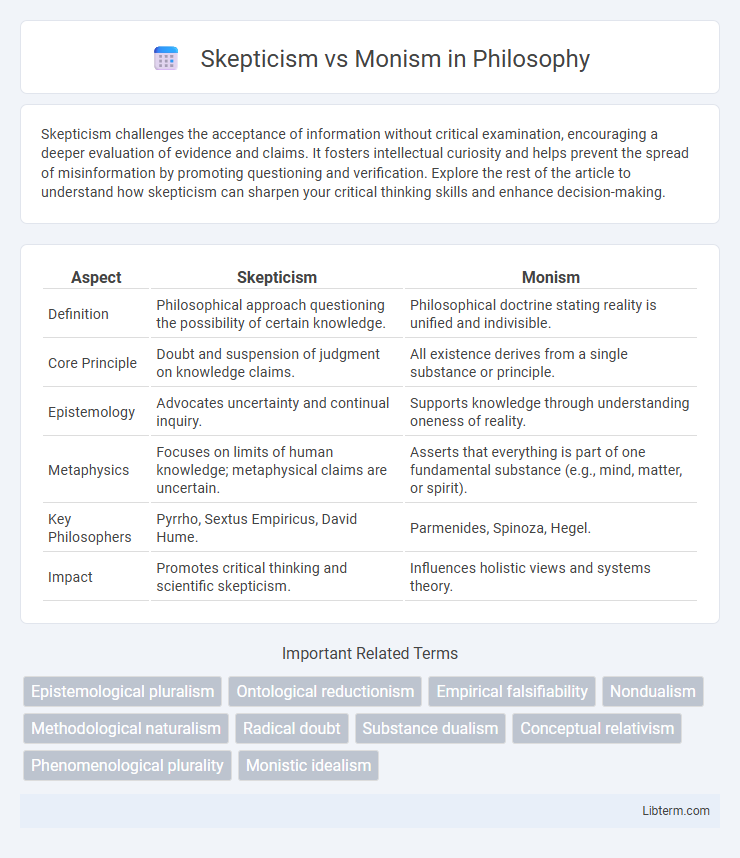Skepticism challenges the acceptance of information without critical examination, encouraging a deeper evaluation of evidence and claims. It fosters intellectual curiosity and helps prevent the spread of misinformation by promoting questioning and verification. Explore the rest of the article to understand how skepticism can sharpen your critical thinking skills and enhance decision-making.
Table of Comparison
| Aspect | Skepticism | Monism |
|---|---|---|
| Definition | Philosophical approach questioning the possibility of certain knowledge. | Philosophical doctrine stating reality is unified and indivisible. |
| Core Principle | Doubt and suspension of judgment on knowledge claims. | All existence derives from a single substance or principle. |
| Epistemology | Advocates uncertainty and continual inquiry. | Supports knowledge through understanding oneness of reality. |
| Metaphysics | Focuses on limits of human knowledge; metaphysical claims are uncertain. | Asserts that everything is part of one fundamental substance (e.g., mind, matter, or spirit). |
| Key Philosophers | Pyrrho, Sextus Empiricus, David Hume. | Parmenides, Spinoza, Hegel. |
| Impact | Promotes critical thinking and scientific skepticism. | Influences holistic views and systems theory. |
Introduction to Skepticism and Monism
Skepticism questions the possibility of certain knowledge, emphasizing doubt and critical inquiry in philosophy, often challenging assumptions and beliefs. Monism asserts that reality is unified and fundamentally composed of one substance or principle, rejecting dualistic or pluralistic interpretations of existence. Both perspectives serve as foundational approaches in metaphysics, influencing debates on knowledge, reality, and the nature of being.
Historical Roots: Philosophers and Movements
Skepticism traces its historical roots to ancient Greek philosophers like Pyrrho and Sextus Empiricus, who emphasized doubt and the suspension of judgment to achieve tranquility. Monism, with origins in pre-Socratic thinkers such as Parmenides and later exemplified by Spinoza's substance monism, asserts the unity of all existence within a single, indivisible reality. These movements reflect contrasting ontological and epistemological perspectives that shaped the foundation of Western philosophy.
Core Principles of Skepticism
Skepticism emphasizes doubt and suspended judgment, advocating that certainty is often unattainable and encouraging continuous questioning of beliefs and knowledge claims. It challenges the notion of absolute truth by asserting that human perception and reasoning are fallible, promoting inquiry through empirical evidence and rational critique. This contrasts with monism, which posits a single, unified reality or substance underlying all existence, often asserting definitive knowledge about the nature of that unity.
Defining the Monist Perspective
Monism asserts that reality is composed of a single, unified substance or principle, whether it be material, mental, or spiritual in nature. This perspective emphasizes the interconnectedness and indivisibility of existence, rejecting dualistic or pluralistic distinctions. By defining all phenomena as manifestations of one fundamental essence, monism challenges skepticism's fragmented questioning of knowledge and existence.
Contrasting Approaches to Truth and Knowledge
Skepticism questions the certainty of knowledge, emphasizing doubt and continuous inquiry to challenge established beliefs. Monism asserts a unified reality or truth, often proposing that all knowledge stems from a single essence or principle. These contrasting approaches create a dynamic tension between persistent questioning and the search for an underlying, consistent truth in philosophy.
Epistemological Debates: Certainty vs Unity
Skepticism challenges the possibility of attaining absolute certainty in knowledge, emphasizing doubt and the limitations of human cognition. Monism advocates for a unified reality or principle, asserting that all knowledge and existence stem from a single source or substance, promoting epistemological unity. The debate centers on whether knowledge requires indubitable certainty or if a coherent, unified understanding of reality suffices for epistemic justification.
Skepticism’s Impact on Scientific Inquiry
Skepticism fosters rigorous scientific inquiry by emphasizing doubt and critical questioning of hypotheses, which leads to thorough testing and validation of theories. This philosophical approach challenges assumptions, minimizes biases, and encourages replication, thereby strengthening the reliability and accuracy of scientific findings. By demanding empirical evidence and continual scrutiny, skepticism drives the advancement of knowledge and prevents premature acceptance of unproven claims.
Monism in Spirituality and Metaphysics
Monism in spirituality and metaphysics asserts that all reality is fundamentally unified and composed of a single substance or principle, rejecting dualistic distinctions between mind and matter. This perspective often aligns with non-dual philosophies such as Advaita Vedanta or Spinoza's substance monism, emphasizing the interconnectedness of existence and the illusion of separateness. By contrast, skepticism challenges absolute knowledge claims, creating a critical tension that encourages deeper inquiry into the nature of unity and multiplicity in the cosmos.
Modern Interpretations and Applications
Modern interpretations of Skepticism emphasize critical inquiry and the suspension of judgment to challenge dogmatic beliefs, influencing scientific methodology and philosophical discourse. Monism, asserting the unity of reality, finds applications in contemporary metaphysics and consciousness studies, particularly in exploring the relationship between mind and matter. Both frameworks inform debates in epistemology and ontology, shaping perspectives on knowledge, existence, and the nature of reality.
Conclusion: Bridging or Dividing Worldviews
Skepticism challenges the certainty of knowledge, emphasizing doubt and continuous inquiry, while Monism asserts a unified reality, promoting a singular underlying essence. The conclusion reveals that these worldviews can either divide by fostering intellectual opposition or bridge by encouraging dialogue that integrates doubt with unity. Understanding their interaction enriches philosophical discourse and advances holistic perspectives.
Skepticism Infographic

 libterm.com
libterm.com